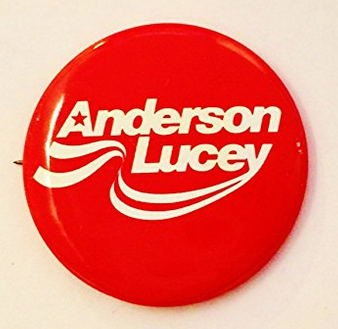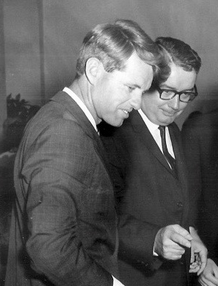Thursday, January 9, 2020
Patrick Joseph Lucey
Patrick Joseph Lucey, March 21, 1918 (La Crosse, Wis.) – May 10, 2014 (Milwaukee, Wis.)
VP candidate for Independent (aka Anderson Coalition aka Anderson Alternative aka Liberal Party aka Anderson for President aka National Unity Party) (1980)
Running mate with nominee: John Bayard Anderson (1922-2017)
Popular vote: 5,586,806 (6.46%)
Electoral vote: 0/538
The campaign:
John B. Anderson had been a US Representative from Illinois for nearly two decades when he ran in the Republican primaries for President in 1980. Initially a very conservative member of the Illinois delegation in the 1960s he shifted to the Left and by the 1970s was considered an animal that is nearly extinct today-- a liberal Republican.
Finding himself out of step with his own party and with no hope of winning the nomination he decided to run as an independent candidate. Basically a centrist, he was more conservative than the Democrats on fiscal matters and more liberal than the Republicans on environment, women's issues, and civil rights. His articulate, direct delivery and opposition to draft registration made him particularly popular with many college and university students.
In two states he was forced to keep surrogate running-mates in order to qualify for early filing. In Texas he selected Milton Eisenhower, in South Dakota it was Nancy B. Flint.
As the Herculean effort to be listed on every state ballot began, Anderson announced that former Wisconsin Democratic Governor Patrick J. Lucey would be the VP nominee. Lucey had been a strong Kennedy man, working in the campaigns of all three brothers-- JFK in 1960, RFK in 1968, and Ted in 1980. Lucey had walked out of the 1980 Democratic convention when Ted Kennedy lost the nomination to President Carter.
Anderson had considered other running mates: Hugh Carey, Jesse Jackson, Morris Udall, Kevin White, Barbara Jordon, Shirley Chisholm, Walter Cronkite, and Edward Brooke. It finally boiled down to Brooke or Lucey, and the Massachsetts Senator had recently acquired some politically damaging baggage, so Lucey got the nod. Although Patrick Lucey was not quite in the top tier of national figures, being a former governor plus an Ambassador to Mexico did add some stature to the ticket plus he was not the type to cause any harm. Lucey had told Anderson that if he wanted his help it would be as Veep or not at all.
Lucey echoed the view of many of his fellow disenchanted liberal Democrats when he said, "I have not abandoned the Democratic Party. It is Jimmy Carter who has abandoned the Democratic Party. He has abandoned the Democratic Party's historical commitment to full employment and has deliberately thrown millions of Americans out of their jobs ... He has abandoned the Democratic Party's traditional faith in the people by blaming the ills of the nation in the malaise of the people rather than his own ineptitude."
I recall whenever Anderson would pronounced the name of his Veep he really punched hard into the surname, "Patrick LUCEY," which struck me as odd.
Anderson scored a big victory when he was allowed to participate in a Presidential debate, but Carter refused to take part saying he didn't want to face down two Republicans. So It was just Reagan and Anderson, the first time a third party candidate took part in such a campaign ritual.
Nixon loyalist, 1980 Reagan campaign operative, and now seven-times convicted felon Roger Stone claims he and the notorious Roy Cohn arranged to deliver a large sum of money to an influential member of the Liberal Party in New York to have them endorse Anderson (which they did) and split the vote (which they also did). Reagan indeed won the state.
As it happens in so many other instances with insurgent parties, Anderson's once threatening polls began to rapidly drop as the election approached. Even so, his total with all three running-mates was 6.61%, one of the more impressive results for a third party in the modern era. But it made no difference in the ultimate outcome of the election although it certainly would not have been a Reagan landslide victory had Anderson not been in the race.
Although Anderson's persistence in gaining nationwide ballot access has been touted, he was able to do so as he built on the past efforts of George Wallace in 1968 and Eugene McCarthy in 1976.
Anderson/Lucey's biggest percentages: Massachusetts 15.15%, Vermont 14.90%, Rhode Island 14.38%, New Hampshire 12.94%, Connecticut 12.22%, Colorado 11.03%, Washington 10.62%, Hawaii 10.56%, Maine 10.20%. Although they didn't carry one single county, these are major results for a third party in a national election.
Election history:
1946 - Justice of the Peace, Ferryville, Wis.
1946 - De Soto School Board
1949-1951 - Wisconsin State Assembly (Democratic)
1950 - US House of Representatives (Wis.) (Democratic) - defeated
1965-1967 - Lt. Governor of Wisconsin (Democratic)
1966 - Governor of Wisconsin (Democratic) - defeated
1971-1977 - Governor of Wisconsin (Democratic)
1980 - Democratic nomination for US Vice-President - defeated
Other occupations: grocery store manager, soldier (WWII), Chair of the Wisconsin Democratic Party 1957-1963, political campaign manager, US Ambassador to Mexico 1977-1979
Buried: Holy Cross Cemetery and Mausoleum (Milwaukee, Wis.)
Notes:
Was a Wisconsin point man for John Kennedy's 1960 campaign, Robert Kennedy's 1968 campaign,
among others.
In 1970 one of his opponents was Georgia Cozzini.
In 1974 his opponents included William D. Dyke and Georgia Cozzini.
Catholic.
Meaningless trivia-- A couple years ago on a road trip I drove on the Governor Patrick Lucey
Highway in Wisconsin which includes his Ferryville stomping grounds. The Mississippi River was
in a mild flood stage at the time. I had to brake for a weird shaggy weasel-like animal that did not
seem to be in much of a hurry to cross the lane.









